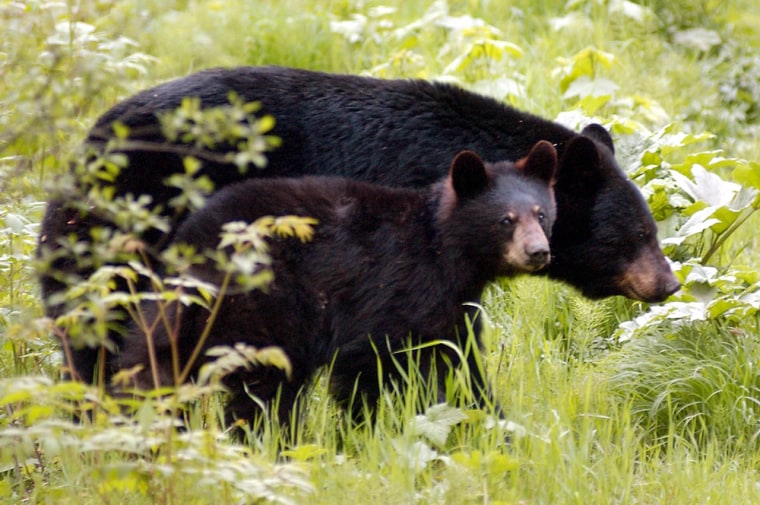Moose and lobster are the signature symbols of Maine, but the black bear has lumbered to the fore in a referendum campaign that is attracting big money and stirring strong emotions.
Voters in Maine, which has the largest bear population east of the Mississippi, will weigh in Nov. 2 on a ballot measure that would outlaw bear hunting with bait, dogs or traps.
Activists pushing for the ban have painted a picture of out-of-state trophy hunters luring bears with bait buckets filled with stale jelly doughnuts and then shooting them like fish in a barrel.
Opponents have warned of a proliferating bear population poised to fan out across suburban neighborhoods, tearing down bird feeders and disrupting backyard barbecues in search of food.
Voters will also decide a bear-baiting ban in Alaska, where a similarly intense and high-priced campaign is being waged ahead of the election. Baiting is a widely used hunting practice in the two states, and accounts for a large percentage of the hundreds of black bears that are killed, skinned and eaten there each year.
Doughnut strategy
Hunters use a variety of tactics in luring in bears: They often leave out 5-gallon buckets filled with stale pastries, doughnuts and raw meat, and wait in tree stands for the animals to take the bait.
In Maine, the two sides are expected to spend more than $2 million on the campaign over bear-baiting.
Supporters of such bans say baiting is cruel and unsportsmanlike.
“Hunting is defined by pursuit,” said Robert Fisk Jr., an animal rights activist and former legislator who led the campaign to put the question on the ballot. “The actual chase precedes the kill. Without the pursuit, it’s merely killing.”
Bear guides disagree, saying hunting with bait requires perseverance and patience. They note that only one-fourth of bait hunters are able to bag a bear.
“It’s a tough job to go out and sit motionless for six hours a day in a tree stand,” said Wayne Bosowicz of Foggy Mountain Guide Service. “It takes a certain breed of hunter. It’s not a walk in the park.”
In Alaska, both sides are accusing each other of allowing deep-pocketed outside group to come in and determine what is good for the state.
The state has between 100,000 and 200,000 black bears. Baiting accounts for about 20 percent of approximately 2,100 black bears hunted and killed annually. Bait can be used only to hunt black bears, not grizzlies.
Opponents of the tactic say baiting simply serves urban and out-of-state hunters who want an easy trophy.
“It is a lazy form of hunting,” John Toppenberg, executive director of the Alaska Wildlife Alliance.
Maine and Alaska are among about 10 states to allow bear-baiting. Six voted during the 1990s on whether to restrict bear hunting, and the outcome was mixed. Colorado, Oregon, Washington and Massachusetts approved such ballot questions; Michigan and Idaho rejected them.
Maine, with a bear population now estimated at 23,000, is the only state to allow hunters to use bait, dogs and traps to snare bears. Hunters kill roughly 4,000 bears annually, roughly three-quarters of them over bait.
TV ad campaigns
The emotional appeal in Maine is evident in the television advertising.
One spot by baiting opponents ends with a handgun being fired at close range at a bear feeding at a bait site, an attempt to portray such hunting as unsportsmanlike.
Pro-baiting advertising includes a spot by an animal control officer who expresses concern about bears wandering into populous areas and alludes to a report this summer about a teenager who escaped serious injury after being attacked by a bear in his yard.
Bosowicz points to problems from growing bear populations elsewhere in the Northeast, including New Jersey, Pennsylvania and Massachusetts. But Fisk denies that bears pose a threat to humans.
“This is a peaceful, nonaggressive animal. Not one person in the state of Maine has ever been killed by a black bear or seriously injured by a black bear,” Fisk said.
More recently, referendum opponents have highlighted the economic benefits of bear hunting, releasing a study that concluded the state’s economy stood to lose up to $62 million and hundreds of jobs if the ballot measure passes. The greatest impact would be felt in regions of the state that lack many other economic alternatives.
Backers of the measure maintain that the economic impact figures are grossly inflated.
Recent polls indicate opponents of a ban have a narrow lead, but animal rights activists believe it is a dead heat.
